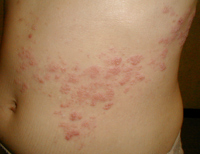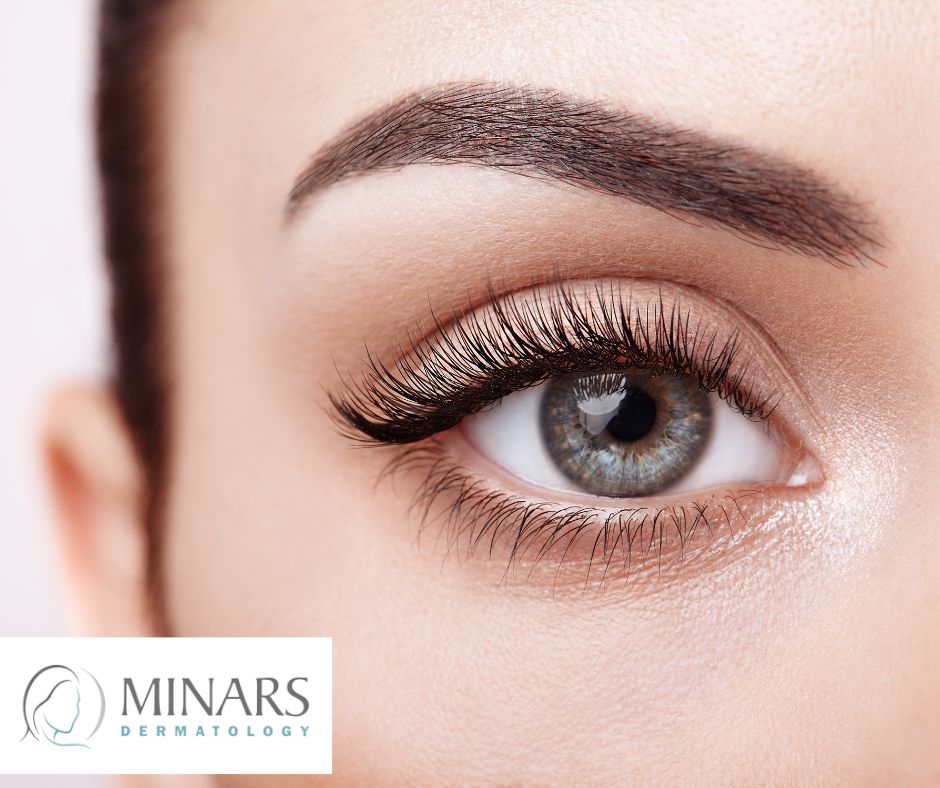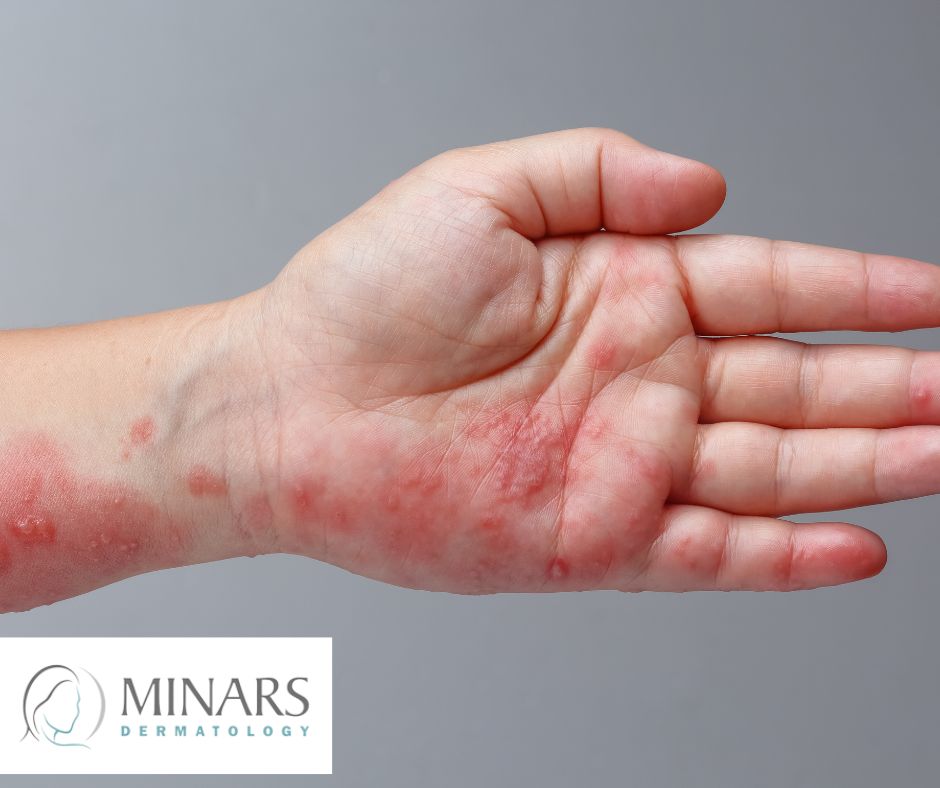One of the most common and most painful skin conditions I see is “shingles” (also known as “herpes zoster”). In fact, as a dermatologist, the only time that I ever need to prescribe strong pain medication is for a patient with a bad case of shingles.
Can a Dermatologist Help With Shingles?
Yes, it can be diagnosed on-site and treated with a commonly available prescription anti-viral like valacyclovir.
What Exactly Are the “Shingles”?
Shingles are caused by the same virus that causes chicken pox: varicella zoster virus. Most people experience chicken pox as a child, it lasts a few weeks and then it is gone. But it is never really “gone”. The immune system wins the war against the varicella zoster virus and the chicken pox clear up, but the virus continues to live inside your body forever; it just goes into hiding.
Shingles occur years later, often when you are run-down or “stressed out” (or sometimes for no reason at all). The chicken pox virus emerges from its hiding place (somewhere in your central nervous system) and travels down a single nerve to erupt in a single line or band on your skin. It is this linear pattern that gives shingles its distinctive look and its name: The word “shingles” is a corruption of the Latin cingulum meaning a belt or girdle. Unlike a belt, however, the rash is only on half of your body and does not cross the mid-line. That is because it only affects the skin that is supplied by the nerve that it travels along.
What Is the Treatment for Shingles?
An oral anti-viral prescription pill like valacyclovir is very effective (most effective if taken within 48 hours of the onset of symptoms)
How Long Do Shingles Last Without Treatment?
The active infection lasts about a week to 10 days. After this amount of time and when all the lesions are crusted over, you are probably no longer “active” and infectious. There is a second set of symptoms that SOME patients experience after the active infection. This is called post-herpetic neuralgia and is experienced as skin sensitivity and sometimes pain in the skin or area that the shingles affected. In PHN the active infection is over but the symptoms remain as a result of the nerve inflammation and while this is usually short-lived (days to weeks) in some cases it can last much longer.
Are Shingles Contagious?
Yes. But you can only transmit the virus to someone who is not immune to chicken pox. Anyone who has ever had chicken pox (or been vaccinated against chickenpox) is immune and cannot “catch shingles” from you.
You can transmit the virus to someone who is NOT immune through contact (contact to the rash or by not washing hands – but not by airborne contacts like a sneeze or cough). AND if you transmitted the virus to one of these people they would “catch” chicken pox (not shingles). The clinical disease caused by the virus VZV is chicken pox. You only get this once – chicken pox happens the first time you are infected by VZV. And shingles is a clinical disease from the reactivation of this virus years later. In other words, shingles are the activation of your own VZV virus – you do not catch it.

Having said that – you should isolate and especially avoid immunocompromised, elderly, or pregnant women when you have shingles (because you don’t know everyone’s chicken pox history and the consequences of VZV in these groups can be serious – even deadly).
Can You Get Shingles if You Have Received the Chicken Pox Vaccine?
Yes. Surprisingly there are cases of shingles in people who were vaccinated against the chicken pox and therefore never had chicken pox. The reason is that the chicken pox vaccine is a live attenuated vaccine. That means that the vaccine is made up of a live virus that has just been modified so that it gives you immunity but not the symptoms of the disease. When people get shingles after the chicken pox vaccine, it is the vaccine virus that is causing the shingles!

What Is the Treatment for Shingles in the Eye?
It is important to see an ophthalmologist for any eye symptoms related to shingles (redness, pain etc…..) They will examine your eye and treat you appropriately.
What Can Be Mistaken for Shingles?
Any linear rash can be mistaken for shingles (because shingles involve a dermatome of skin and therefore usually present as a linear rash).
Another common linear rash (that sometimes presents as blisters – similar to shingles) is allergic contact dermatitis. For example, if you are “brushed” by a leaf of poison ivy or some other plant you are allergic to – you may develop a linear rash that can look a lot like shingles.
Can Shingles Be Deadly?
In most people shingles is an annoying skin rash. Some people get more serious symptoms and even long-lasting post-herpetic neuralgia. In very rare cases it can be deadly (for example if it is untreated in an immunocompromised patient)
The “Aftermath”- Post-herpetic Neuralgia:
The problem with shingles is that you don’t just suffer while you have it, many people continue to be uncomfortable for weeks or months after the rash is gone. This is called “post-herpetic neuralgia”. The nerve that the virus traveled along remains irritated from all of the inflammation that the infection caused. The symptoms can range from a nagging tingle that lasts a few weeks, to outright pain that lasts for months and requires treatment from a neurologist. There are effective new medicines for post-herpetic neuralgia, but the most effective treatment is to prevent the problem in the first place. Get vaccinated!
The “Shingles” Vaccine:
Recently a shingles vaccine has become available (as opposed to the chicken pox vaccine). It is called Zostavax and it is very effective at preventing the shingles. It is recommended for people over the age of 60, because the older you are the more likely you are to get shingles and the worse it usually is. However, at this time, many insurance companies do not cover the vaccine. But take it from someone who treats a lot of patients with this disease (and who has no conflict of interest), you do not want shingles: get vaccinated, especially if you are over 60 years old. We do not carry the Zostavax vaccine in our office.

Contact Our Hollywood, FL Dermatologist Office About Your Shingles Rash
If you are dealing with a painful, itchy, or annoying rash don’t hesitate to contact our office to book an appointment to see one of our certified dermatologists today. They will be able to quickly assess the rash to determine if it is shingles or not and recommend an appropriate treatment path to deal with it quickly and get you feeling better. Book an appointment today.
We also handle pediatric rashes, acne, cancer screening, pityriasis rosea, and more.
See What Our Patients Have to Say About Us:
“Dr. Todd Minars was wonderful. He saw my daughter on short notice and was able to diagnosis her rash quickly and treat it. Great office staff. Would highly recommend Minars Dermatology!”
Laura Z.
Rating 5/5 ⭐⭐⭐⭐⭐
And read more of our 907+ reviews on Google.










